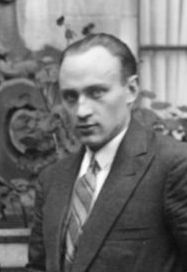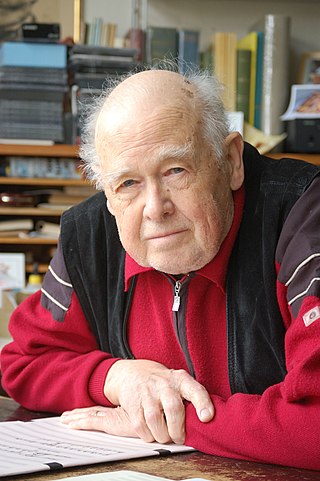Related Research Articles

Karl Amadeus Hartmann was a German composer. Sometimes described as the greatest German symphonist of the 20th century, he is now largely overlooked, particularly in English-speaking countries.

Paul Sacher was a Swiss conductor, patron and billionaire businessman. At the time of his death Sacher was majority shareholder of pharmaceutical company Hoffmann-La Roche and was considered the third richest person in the world with an estimated net worth of US$13 billion.

Hans Werner Henze was a German composer. His large oeuvre is extremely varied in style, having been influenced by serialism, atonality, Stravinsky, Italian music, Arabic music and jazz, as well as traditional schools of German composition. In particular, his stage works reflect "his consistent cultivation of music for the theatre throughout his life".
The Domaine musical was a concert society established by Pierre Boulez in Paris, which was active from 1954 to 1973. Composers represented at its concerts included Boulez, Karlheinz Stockhausen, Olivier Messiaen, Luciano Berio, John Cage, Sylvano Bussotti, Mauricio Kagel, Hans Werner Henze, Henri Pousseur, Ernst Krenek, Gilbert Amy, Peter Schat and Gilles Tremblay, Betsy Jolas as well as earlier composers considered part of the Modernist movement in music. Its regular performers included the pianists Claude Helffer, Paul Jacobs, Yvonne Loriod and Marcelle Mercenier.
Matthias Pintscher is a German composer and conductor.

The Bassarids is an opera in one act and an intermezzo, with music by Hans Werner Henze to an English libretto by W. H. Auden and Chester Kallman, after Euripides's The Bacchae.
Hans Werner Henze's Symphony No. 1 was premiered in Darmstadt in 1947. The premiere was hit by Henze's accustomed bad luck. The orchestral parts, handwritten by the composer himself, had become illegible during photocopying in Schott’s offices and despite the young composer’s best efforts to ink in the parts throughout the night, only the slow movement was performed. The whole symphony was eventually premiered a year later, although Henze himself conducted the work only after comprehensive revision.
Wolfgang Fortner was a German composer, composition teacher and conductor.

Requiem is an instrumental musical composition by Hans Werner Henze, premiered in Cologne on 24 February 1993. It consists of nine sacred concertos for piano solo, trumpet and large chamber orchestra. About this piece, the composer has the following comments.
These nine instrumental pieces are concerned with the human fears and problems of our time, with illness and death, love and loneliness, and in particular with the character of Michael Vyner, an extremely lively and passionate man, his life and his death, and my grief at his loss which stands for the loss of so many others who have also tragically departed from our world. The spirit of this music can be explained by such facts and by our time, by which it seems to me to be strongly influenced, by its horrors and passions, its beauty and dynamics. The movements of the Requiem can be played separately or in any desired combination. Hans Werner Henze

Giselher Wolfgang Klebe was a German composer, and an academic teacher. He composed more than 140 works, among them 14 operas, all based on literary works, eight symphonies, 15 solo concerts, chamber music, piano works, and sacred music.
Tristan is a six-movement orchestral work by the German composer Hans Werner Henze.

Das Floß der Medusa is a secular oratorio by the German composer Hans Werner Henze. It is regarded as a seminal work in the composer's alignment with left-wing politics.

El Cimarrón is a scenic vocal composition by the German composer Hans Werner Henze, written when the composer lived in Cuba in 1969–1970. It is subtitled Biographie des geflohenen Sklaven Esteban Montejo, and the libretto by Hans Magnus Enzensberger is based on the oral autobiography related in 1963 to Miguel Barnet by Montejo, who was also a veteran of the Cuban War of Independence (1895–98).
Symphony No. 5 by Hans Werner Henze was written in 1962.
Voices is a musical composition by the German composer Hans Werner Henze.

Garth Knox is a violist and composer who specializes in contemporary classical music and new music.

The Cantiere Internazionale d'Arte is an annual international summer school and musical festival for young singers, actors, musicians, conductors and composers. It was set up in Montepulciano, Italy, in 1976 by Hans Werner Henze. Several works received their world premieres at the festival.
Fantasia for Strings is a composition by German composer Hans Werner Henze. It was finished in 1966, as part of the soundtrack for Volker Schlöndorff's film adaptation of Robert Musil's novel The Confusions of Young Törless. This composition has been published by Schott Music.
The String Sonata No. 1, commonly referred to by its original Italian name Sonata per archi, is a composition for string orchestra by German composer Hans Werner Henze. It was composed between 1957 and 1958.

The Double Concerto by German composer Hans Werner Henze is a double concerto for oboe and harp, better known by its original Italian title Doppio concerto. It was completed and first performed in Zurich in 1966, and published by Schott.